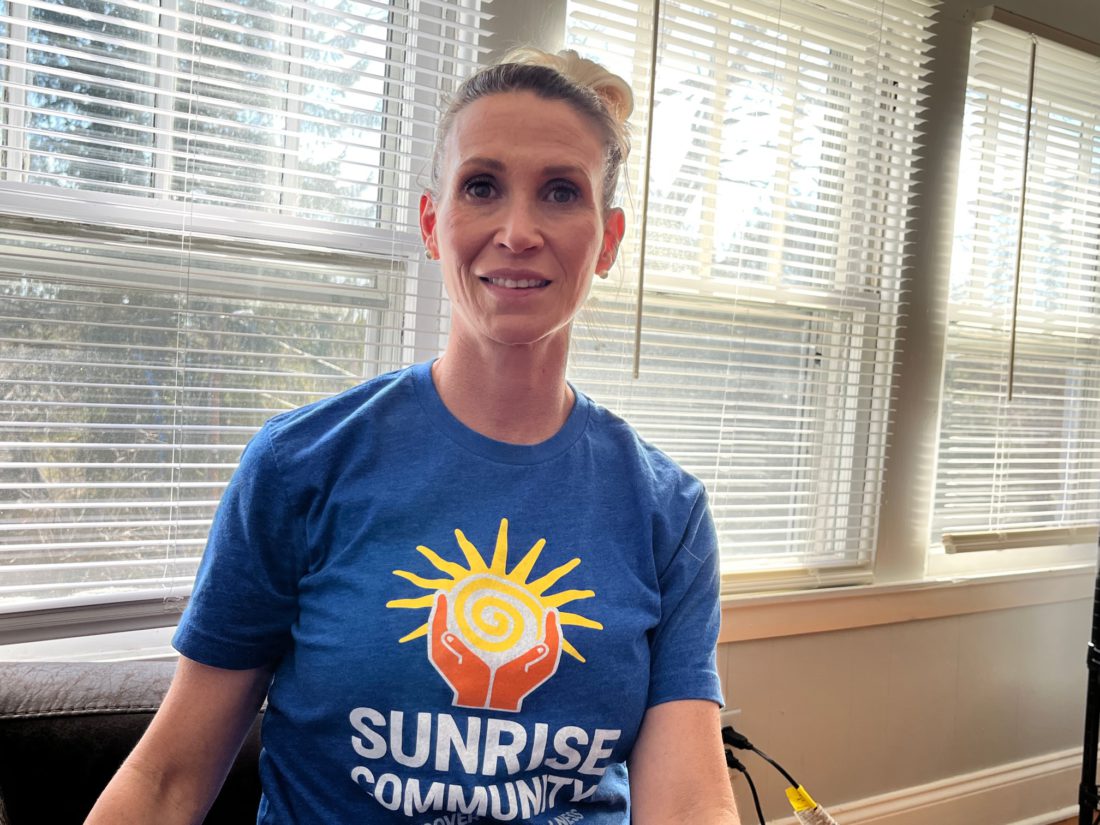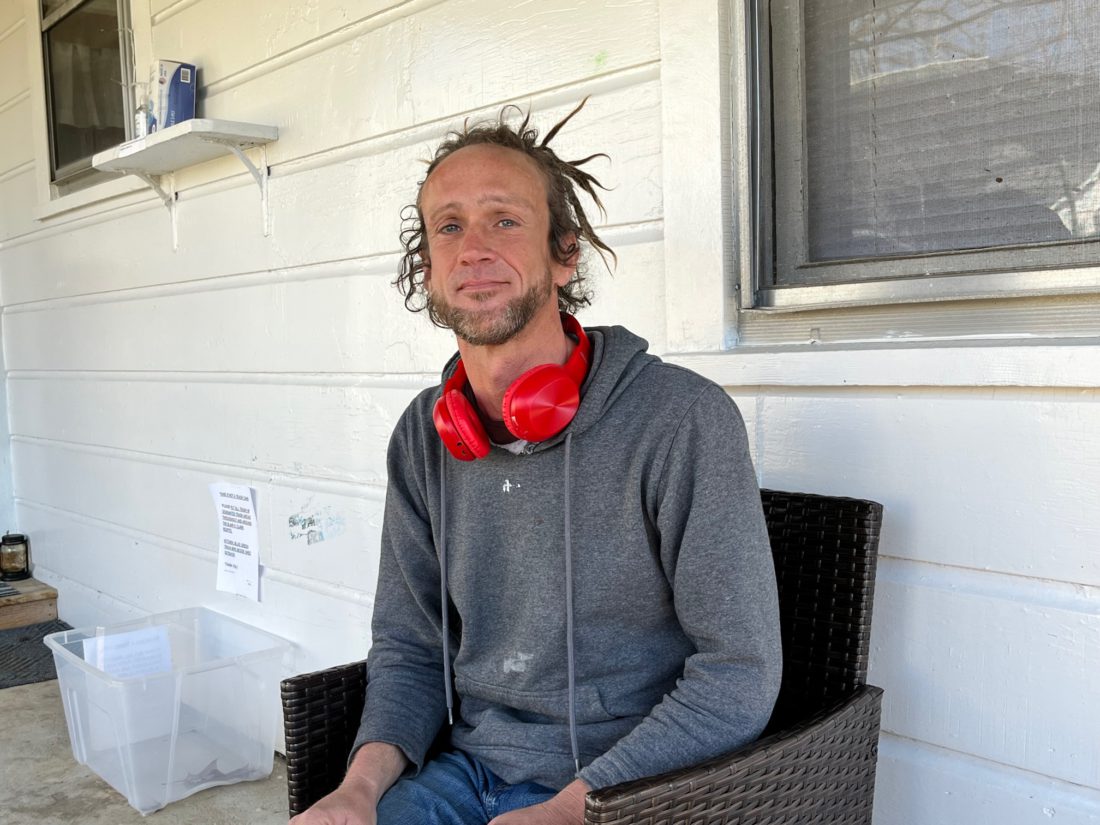A residence on a quiet street in West Asheville is home to a unique program in Western North Carolina: a peer-run respite house that allows people with mental health conditions to take a much-needed break and potentially prevent a mental health crisis.
Operated by Sunrise Community for Recovery and Wellness, a nonprofit dedicated to substance abuse recovery, the Blair H. Clark Respite Center is staffed around the clock by certified peer support specialists. Each guest may stay for up to seven days at a time, and “it doesn’t cost anybody a dime to come here,” says Rachel Brock, executive assistant at Sunrise. Health insurance isn’t required for a respite stay either.
Guests at the respite usually have preexisting mental health conditions, especially anxiety and depression, explains Kevin Mahoney, co-founder of Sunrise and a peer support specialist at Mountain Area Health Education Center. Additionally, guests usually lack some social determinants of health, like food security and access to safe housing.
The respite welcomed its first guest in January 2018, says Sunrise finance director Jacqui Derreberry. The service closed temporarily at the beginning of the COVID-19 pandemic. Since its reopening, the need for respite care in Asheville has been so great that Sunrise recently upgraded from a three-bedroom house in West Asheville to its current five-bedroom location. Sunrise spokesperson Jodi Ford says the respite hosted 52 guests from April 2021, when it reopened, through the end of 2021. During 2022, it hosted 121 guests.
A steppingstone
Reasons for respite care vary, says Brock. Often a guest, who must be age 18 or older, simply needs a “separation from their current situation.”
Some guests arrive after being discharged from Mission Hospital Copestone, a mental health facility, “and need one more steppingstone before they go back out into the community,” she explains. Others have living situations, both housed and unhoused, that are negatively impacting their mental health conditions. For example, one guest lives with his parents and stays at the respite a few times per year when that situation becomes stressful. “It gives him a chance to just reset.”
Two advance-screening phone interviews by Sunrise staff are required for admission. A preliminary phone interview captures a potential guest’s demographic information. A follow-up phone interview 48 hours later is more thorough, with questions about mental and medical health “to get a feel for their situation,” Brock explains.
The respite isn’t equipped to “take someone who is in active crisis,” she continues. Unlike a psychiatric or rehabilitation facility, the center doesn’t employ medical staff to evaluate medications. Mahoney adds, “We don’t prescribe, medicate, therapize or do anything considered therapy” — noting instead that respite is meant to be “a place to decompress” from daily life.
The respite doesn’t host support groups or 12-step meetings either. However, staff can dispense bus tickets for individuals who want to attend such gatherings or connect to them over Zoom via the television in the living room, Brock says.

She also says peer support training covers basic mental health support, and some staff members are trained in mental health first aid. But the respite hasn’t had situations where a guest’s mental distress “got out of control to a point that we couldn’t handle it.” She adds, “We use our own lived experience and compassion for others to connect with individuals dealing with mental health symptoms.”
Blair H. Clark Respite Center isn’t the only respite care in the city; founded in 2014, Haywood Street Congregation offers short-term respite care for unhoused adults after hospitalization. Haywood Street Respite is equipped to support individuals recovering from illness, while Sunrise’s respite is not.
Why respite?
The Blair H. Clark Respite Center operates like the release on a pressure valve, in a sense. It provides a safe, homelike environment where individuals can slow down and recharge — ideally tempering their current mental health struggles into a more manageable state.
In this way, respite care can offer a potential diversion from the traditional mental health crisis routes like emergency room visits or involuntary commitment at psychiatric facilities, according to the nonprofit Legislative Analysis and Public Policy Association. A presentation by the Substance Abuse and Mental Health Services Administration for the National Association of State Mental Health Program Directors says peer-run respites enable “continuity of care and life in the community” and are “empowering [and] less traumatic.”
Respite care may also be less expensive than hospitalizations. (Blair H. Clark Respite Center is funded through the federal SAMHSA’s mental health block grant, says Brock.) A study published in the journal Psychiatric Services in 2018 found that Medicaid expenditures for people who used peer-run respite centers in New York City “were on average $2,138 lower per Medicaid-enrolled month, and there were 2.9 fewer hospitalizations for crisis respite clients than would have been expected in the absence of the intervention.”
Sunrise modeled its peer-run respite house on examples the founders had seen in Georgia, says Derreberry. Asheville’s respite house was the only one in North Carolina when it opened. However, in 2021, Retreat @ the Plaza, a peer-run respite house operated by the nonprofit Promise Resource Network, opened in Charlotte, according to N.C. Health News.
The house
The Blair H. Clark Respite Center, whose location Xpress is not sharing in order to protect the guests’ privacy, has four bedrooms, two bathrooms, a kitchen and a backyard patio. A fifth bedroom is currently being used as office space; Brock anticipates it will be refurbished into another sleeping area soon.
Each bedroom is private, locked with a keypad, and equipped with a queen-size bed and a dresser. Guests must arrive alone; no couples, children or pets are allowed. Guidelines include no drugs, alcohol, paraphernalia, pornography or weapons, Brock says.

Sunrise previously received funding for food, but now that the funding has ended, it receives meals donated by the nonprofit Food Connection, which redistributes unserved food from catered events and restaurants. Those meals are stored in one refrigerator, while a second refrigerator allows guests to store any groceries.
The kitchen is also equipped with a toaster, a Keurig coffee maker, an air fryer and a dishwasher; a washing machine and dryer are available in the basement. The dining room has a bookcase stacked with fiction, self-help and coloring books; there are ample board games, puzzles and art supplies, as well as a TV with cable and Netflix and a computer with internet access. Rounding out the comforts of home are a backyard firepit and patio furniture.
Joshua Roseman, who is currently unhoused, was staying at the respite when Xpress visited. He says his stay allowed him to feel “normal” for a while, especially when watching the Super Bowl the previous weekend with other guests.
For him, the respite house was a much-needed break from living on the street, giving him a chance to “rest without being told to ‘move.’”
‘Need someone to listen’
Though not a clinical setting, the Blair H. Clark Respite Center provides valuable resources for those with mental health conditions: trusted people who can listen with compassion.
“I think the bulk of it is listening,” Brock says about the center’s work. “A lot of people just want or need someone to sit with them and listen.”
While some guests do want a listening ear and companionship, others prefer to rest and recharge alone. How guests choose to pass their time during a respite stay is up to them.
“Some people might come and be so exhausted from what’s going on that they sleep the entire seven days, get up and eat and go back to bed because they’re under that much stress,” Brock says. “And that’s OK. We don’t decide what we feel like is best for somebody.”



Before you comment
The comments section is here to provide a platform for civil dialogue on the issues we face together as a local community. Xpress is committed to offering this platform for all voices, but when the tone of the discussion gets nasty or strays off topic, we believe many people choose not to participate. Xpress editors are determined to moderate comments to ensure a constructive interchange is maintained. All comments judged not to be in keeping with the spirit of civil discourse will be removed and repeat violators will be banned. See here for our terms of service. Thank you for being part of this effort to promote respectful discussion.